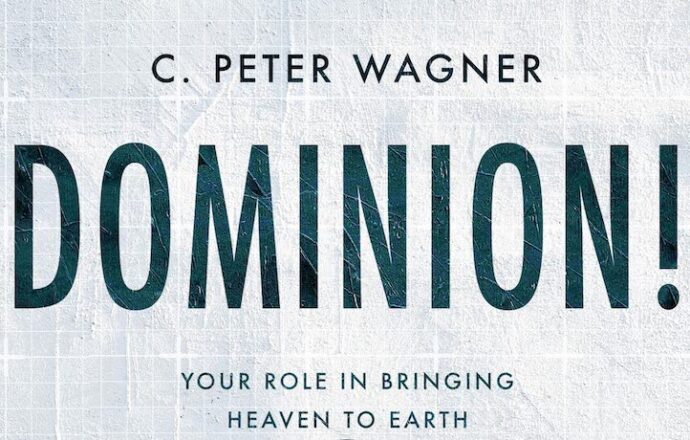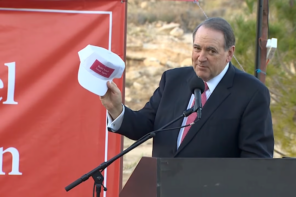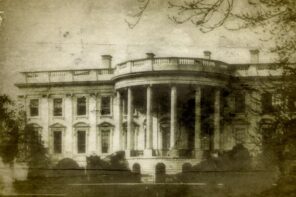The rifts in the New Apostolic Reformation that emerged last year have erupted into a full-blown identity crisis. This is a crisis born, in part, of the movement’s desire to project a benign Christian image to distract from public scrutiny of its profoundly theocratic vision and anti-democratic politics.
This was on vivid display this summer at the Bridge Summit, a virtual conference of the U.S. Coalition of Apostolic Leaders (USCAL), which is the U.S. arm of the International Coalition of Apostolic Leaders (ICAL). Much of the meeting was a repetition of the main points of the group’s earlier statements on prophetic standards and on the NAR and Christian nationalism. But the main focus was, as they put it, “the so-called New Apostolic Reformation,” an attempt to distance the movement from its widely accepted name. As André Gagné and I have reported, these statements of factional posturing don’t go very far and hold no one to account.
Thus while much of the Summit sought to define what they are (and what they are not) in the face of criticism and controversy, the Dominionist agenda of the movement remains unchanged.
In conversations that probably would have been better to hold behind closed doors, leaders openly disparaged others in the movement, griping about “aberrations” in belief or worship style, like “hypercharismania or extreme forms of Christian nationalism,” as well as “rabid charismania” and “charisfanatics.”
As with their published “statements” it’s not entirely clear exactly who or what the speakers are referring to, though they’re most likely referring to those they had previously called out (to no avail) for false Donald Trump prophecies, embrace of the Big Lie, and participation in the J6 insurrection.
It is fair to say, however, that while the systematic Reformed theologies they lean into are far less flamboyant and accelerationist than some others in the Pentecostal and charismatic camp, their core beliefs are every bit as revolutionary.
Indeed, the Bridge Summiteers also sought to distance themselves from the Dominionism that defines their movement, as they struggle to emerge from the long shadow of the late professor, prolific author, and ostensible movement leader, C. Peter Wagner.
Identity politics
NAR has long sustained criticism from a wide range of scholars and journalists, including several writing at RD. We needn’t rehash all that except to note that a number of the Summit’s participants suggested that the name of their movement poses a public relations problem.
While the term New Apostolic Reformation* has stood the test of time for more than a quarter of a century, some don’t like it, mostly because others in the movement have been harshly criticized. Several speakers argued that NAR should not be used because, even among those in the movement, most have never heard of it. Of course there are many standard terms used by scholars and journalists that lay members of religious movements and institutions may be unfamiliar with, like Mainline Protestantism, Catholic integralism, and premillennial dispensationalism, to name just a few.
The simple fact is that there’s nothing wrong with this well conceived, widely used, and utterly neutral term. The NAR has many tendencies, just like other broad expressions of Christianity. Mainline Protestantism is also a broad encompassing term, despite the fact that the communities within it can be quite different. No one term can capture everything, and further explanation is almost always necessary.
The rifts run silent and deep
Just as the movement is not entirely defined by its name, it’s also not defined solely by its most prominent leader. C. Peter Wagner was the movement’s guiding light and éminence grise for two decades, during which he led ICAL from 2001-2009. But just because some movement leaders differ from Wagner on some things, and disagree among themselves on others doesn’t mean that the term NAR should be abandoned or that the movement doesn’t exist. It just means that the movement is diverse; people often see things differently; sometimes behave badly; and they don’t always get along. (Same as any other social movement that ever was.)
Mattera opened the Summit, complaining:
“It has been unfortunate that many people classify everybody who embraces apostolicity with the same characteristics as those who are aberrant in some of their teachings, and gone off the rails with hypercharismania or extreme forms of Christian nationalism. And so the narrative that the media spins, and even some evangelicals, is to classify everybody in the same category, including yours truly.”
Panelist Michael Brown said that, while they don’t deny that “abuses” and “aberrations” occur, they want to “burst the bubble of this fictitious NAR conspiracy”—by which he may be referring to the aggressive religious and political ambitions and activities described by reporters, scholars, and other movement critics. Mattera and Brown don’t like being publicly associated with many in the movement they still wholly embrace. Mattera likewise complained about unnamed “aberrant” members of the movement, and the “rabid charismania that’s going on in some circles,” which he calls “fringe.” But without naming the members, beliefs, or actions he seeks to disavow, such complaints are difficult to take seriously.
It is certainly true that sometimes generalizations about NAR—or anything else—can stray into broad-brushing, but USCAL’s public relations problems are mostly of their own making. They’re engaged in a complicity of silence regarding the far-right involvements, violent ideas, theocratic visions, and insurrectionist activities of many in their movement. They’re also disingenuous about their Dominionism, and suffer from a lack of transparency about their leadership, membership, and financing.
Echoing Mattera and Brown, Kelly also denounced “aberrations” and “the wild charismatic phenomena,” adding that “you are not having a meeting unless half the crowd is laying on the floor shaking, or something like that.” He further complained about those who, he says, misuse scripture to justify “casting out of demons.” He said that “one of the things I think everybody [here] agrees with, is the extremes of what I call the charisfanatics… they’ve done a lot to hurt our movement.”
It’s telling that Kelly’s concern is limited to what he terms “our movement.” Neither he nor any of the speakers expressed concern about the damage their movement has done and continues to do to the human and civil rights of others, as well as American democracy and its institutions.
No glitter left
In the Summit’s final hour Mattera introduced Apostle Mark Pfeifer of Chillicothe, Ohio as his successor as Convener of USCAL. According to Pfeifer the apostolic movement, once seen as the shimmering edge of the next Great Awakening, has lost its luster. Unable to address USCAL’s PR issues, he clearly intends to change the subject.
“The newness of the apostolic movement has worn off,” Pfeifer declared. “I don’t think there is any glitter… left whatsoever.”
Indeed, the one-day event on Zoom staged by NAR intellectuals, paled before the national audiences, televised spectacles, and access to power enjoyed by many of the glitterati of their movement—such as Apostles Dutch Sheets and Lance Walnau—who are often featured at events hosted by the attention-grabbing Flashpoint Live program. These events draw in-person audiences of thousands and are broadcast on major cable networks and social media.
Pfeifer nevertheless believes that they can put the controversies about NAR and Christian nationalism behind them by focusing on what he considers to be the “most powerful…divisive…[and] defining issue of our day”: “same sex and transgender ideologies.”
He says that typical churchgoers aren’t concerned about the controversies surrounding NAR and Christian nationalism, but they are concerned that “same sex and transgender ideologies may be being taught in school…[and that] Kids [are] being exposed to this.”
Trumpian Apostle Lance Wallnau joined Pfeifer’s fear mongering in July telling attendees at the Her Voice Conference:
“When it comes to movement in America, not everybody’s going to become Christian to fight transgenderism. But everybody will fight transgenderism, if we frame it as an attack against your children”
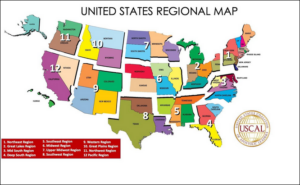
The new 12-region structure of a leading New Apostolic Reformation network.
On a practical note, Pfeiffer also announced the new national structure of USCAL, which will be the body that seeks to more methodically deliver on their religious and political vision. They aim to take a less top-down, more bottom-up approach to “reformation,” and emphasize the local church. He and other Summit speakers indicated that this would be the direction of their politics as well, because, as he declared, “Our country needs us.” For each of the 12 regions they divide the nation into there will be a council and a coordinator. The 12 coordinators will comprise the national leadership. This is the structure with which they seek to advance the movement in America, bringing it into alignment with ICAL’s approach to national coalitions.
Beyond borders
A source of hope for this, the more intellectual wing of the movement may come from a surprising source: immigration from the global South. The fact is that many NAR leaders are not in political lockstep with others on the Christian Right when it comes to immigration.
The NAR movement is more complicated than the popular US-centric narratives about Christian nationalism and White Christian nationalism. André Gagné and I have written, for example, that NAR is multi-racial, multi-ethnic, and multinational. Mattera, who identifies as “Puerto Rican and Italian,” writes in his 2022 book, The Global Apostolic Movement & The Progress of the Gospel, that he doesn’t understand why many conservative evangelicals object “to the immigration of Muslims and Latinos.”
“I am against illegal immigration, but will welcome and aid any illegal that comes to our church…. We have seen many Muslims come to Christ in our community through children’s outreaches, which have been able to provide aid to their families.”
When it comes to Christian nationalism, Mattera sees the “nationalistic spirit” of (unnamed) apostolic leaders of both “the far right” and “far left” as problematic—when they put nationalism ahead of advancing the Kingdom of God. Paradoxically, his own vision of Christian dominion in the US and other nations, is actually itself a variety of Christian nationalism.
The Ft. Worth, Texas-based Kelly claims the global movement, especially in the global South “is “growing at a very, very strong rate… in spite of all the accusations regarding the NAR and so forth.” He also claims that a major source of American apostolic church growth comes from Latin American migrants—many of whom are Pentecostal.
He argues that their strongest national coalitions are in countries where there is “persecution against the church.” Interestingly, he also predicts that church growth generally will come more from “persecution” than from “revelation” and observes that mass migrations from troubled parts of the world have generated significant church growth in the more developed countries of the Southern Hemisphere such as Australia and New Zealand.
“They are coming into America and Canada, and Europe as well,” he says.
Pentecostal migrants to Europe come mostly from Africa, he says, noting that some of the largest churches in Europe have “apostolic leaders who refer to themselves as bishops or apostles.” Similarly, he notes that “many” of the “illegal aliens” coming into the U.S. from Central America are Pentecostals and include pastors and adds that “illegal aliens,” whose congregations are mostly migrants as well, lead 50 churches in the Dallas /Ft. Worth area alone.
Notably, ICAL claims to be the largest apostolic network in the world, comprising coalitions in 47 nations and members in 87 countries.
It’s the substance, not the slogan
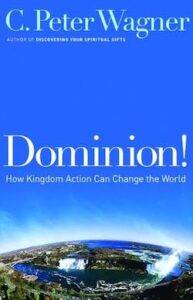
The book NAR leaders stumble over.
Kelly, turning his attention to another PR problem, complained about terms that are being “loosely used, such as dominion” (though he’s probably less concerned about the precision of the term, which he made no effort to define, than he is that a major theological underpinning of NAR is gradually being seen for what it is).
Apostle C. Peter Wagner’s 2008 book Dominion: How Kingdom Action Can Change the World, made the case for taking societal dominion via the metaphorical 7 Mountains of culture, dividing the comprehensive vision of dominion into easily understandable categories. While ICAL had long embraced 7M, Kelly insists that they only sought “influence,” not dominion. But that claim doesn’t quite hold-up in light of their history, and plenty of evidence from their present.
In fact, a featured “teaching” on the ICAL web site to this day is actually the guts of the Dominionist, anti-democratic doctrines and politics that endarken our time: The “Biblical Worldview Documents” were produced in the 1980s and 90s by a collaboration of hundreds of Pentecostal, Reformed, and other evangelical leaders—called the Coalition on Revival (COR).
These helped major factions of evangelicalism disentangle areas of agreement from disagreement, including how to justify engagement in politics. The process pulled many historically apolitical evangelicals into the theocratic maelstrom known as the Christian Right. ICAL pretty clearly seeks to continue the process, declaring:
“The Biblical Worldview documents… state positions that the members of ICAL hold to be true.” [Emphasis added]
One of the documents they hold to be true is A Manifesto for the Christian Church, announced at a Fourth of July signing ceremony in 1986 at the Lincoln Memorial in Washington, DC. It was ultimately signed by 400 evangelical leaders including C. Peter Wagner, and such prominent charismatics of the time as Ern Baxter, Bob Mumford, and Charles Simpson; the leading thinkers of Christian Reconstructionism—including R.J. Rushdoony, Gary North, and Gary DeMar; as well as Harold Lindsell, Editor Emeritus of Christianity Today, Christian Right leader Tim LaHaye, and Adrian Rogers, president of the Southern Baptist Convention, who was a leader in the fundamentalist takeover of the denomination.
COR founder Jay Grimstead’s explanation (which has been taken down) of this broad move of evangelicalism, (lifted from one of COR’s 25 Articles of Affirmation and Denial on the Kingdom of God), illuminates the anti-democratic totalism of the Dominionist agenda.
We deny that anyone, Jew or Gentile, believer or unbeliever, private person or public official, is exempt from the moral and juridical obligation before God to submit to Christ’s lordship over every aspect of his life in thought, word, and deed.
Long before the 7M campaign, COR had identified a whole metaphorical mountain range in need of conquest, and which are highlighted in the Biblical Worldview Documents:
“the biblical principles for all worldview areas of human life including theology, evangelism, discipleship, law, civil governments, economics, education, family, medicine, psychology and counseling, arts and media, business and professions, and science and technology… [and]… where the entire Church must stand and what action it must take to accomplish its task in this new millennium.”
These facts notwithstanding, the relentless quibbling about terms and denial about whether or not contemporary theocratic political movements are significant or even exist, (and if they do, what to call them) is by now to be expected.
Nevertheless, we need to recognize that whatever their merits, these (sometimes-bad faith) discussions provide distracting smokescreens for the unambiguous theocratic goals, deep divisions, and sometimes-violent activities of some of the religious and political movements of our time. That’s why scholars, journalists, and activists seeking to defend our still democratic and pluralist society must focus on the substance of what they’re about, not the slogans.
*André Gagné and I summarized C. Peter Wagner’s reasons for the name here at RD.


